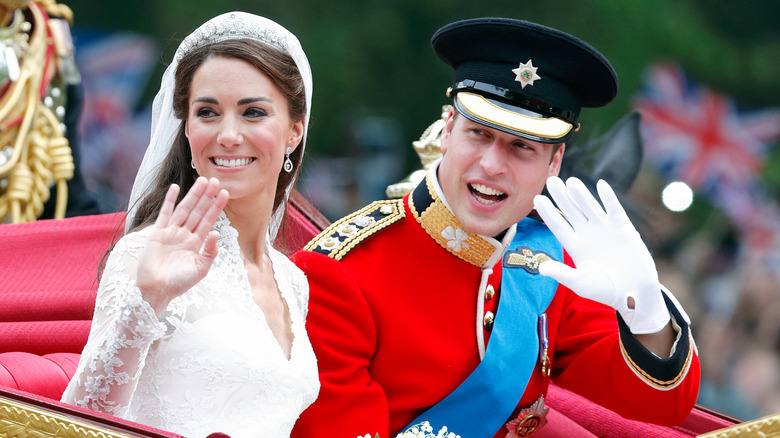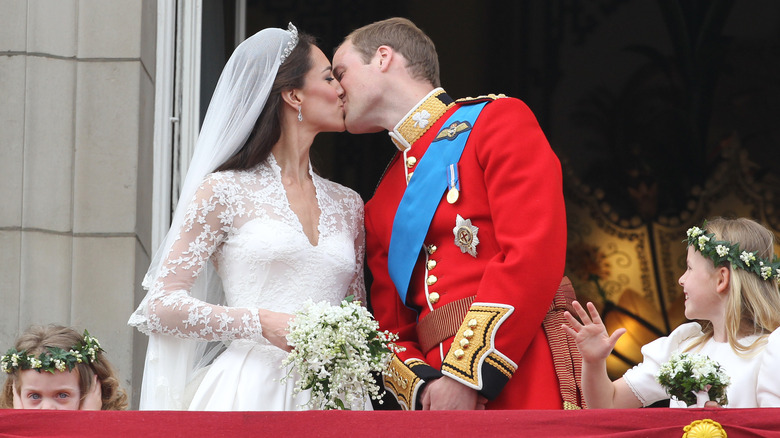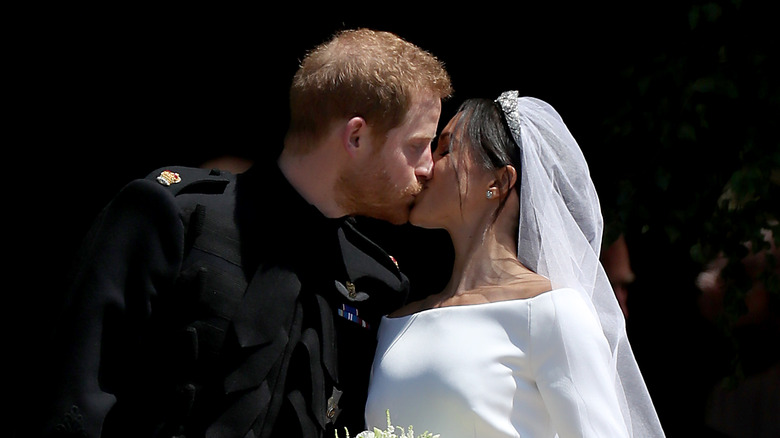Why Royals Don't Kiss After Exchanging Vows
The line "you may now kiss the bride" is as ingrained in our collective image of a traditional wedding ceremony as the lines "to have and to hold" and "in sickness and in health." However, as traditional as royal weddings tend to be in England, newlywed couples are usually not invited to kiss directly after they've taken their vows. Why is that?
If you recall the highly-televised royal weddings of the then-Prince Charles and Princess Diana, of Prince William and Kate Middleton, or of Prince Harry and Meghan Markle, you may remember that none of these couples kissed one another inside the church directly after they made their lifelong promises to each other. The reason, it turns out, is a pretty simple one. Churches are still traditionally thought to be places of propriety and piety, and since the royal family aims to appear prim, proper, and polite at all times, it has long been the tradition that they do not kiss inside of a church lest it appears unseemly, according to People. It's not exactly forbidden, it's just not common practice.
That said, this generation's royal couples have found other ways to publicly display their affection (and other places to kiss) during their wedding celebrations.
A new royal tradition: Kissing on the palace balcony
Back when King Charles III was still Prince Charles, he did not kiss his first bride, Lady Diana Spencer, during their elaborate wedding ceremony. He did, however, break with royal tradition by going in for a very public kiss on the balcony of Buckingham Palace after the ceremony was over. It was a break from previous practice. When King Charles' parents, Queen Elizabeth II and Prince Philip, were married several decades prior, the couple did not display any physical affection to the public during their wedding celebration. In fact, they did not even hold hands when stepping out of the church as a newlywed couple.
At the time, though, this rather professional distance between the newly married couple would have made sense and seemed appropriate. In the 1950s, it would still have been viewed as unseemly for the queen and her new husband to engage in much (or any) PDA. That was something to be done privately; publicly, it was important they appeared happy, but still stoic and professional.
In 2011, when Prince William married Kate Middleton, they followed the lead of William's parents by kissing each other on the balcony of Buckingham Palace as the crowd roared below. To this day, the image of this kiss is still one of the most recognizable of the couple's big day.
Prince Harry and Meghan Markle and their famous PDA
In keeping with royal tradition, Prince Harry and Meghan Markle did not kiss each other inside the church during their 2018 wedding ceremony and instead opted to have their first public kiss as husband and wife outside St. George's Chapel. While the couple would go on to break several royal traditions, their wedding actually followed quite closely to what would have been expected of them.
Harry and Meghan have, however, made several headlines about their public displays of affection since getting married. Specifically, it has been noted that while most royal couples walk side-by-side when out in public, Harry and Meghan are virtually always holding hands. So much has been made of this fact that publications like Express have gone so far as to analyze all the different ways the couple holds hands.
Even before they were married, writers were discussing how the couple's constant public handholding could be seen as "inappropriate" (via Grazia). Comparisons were often made to Prince William and Princess Catherine, who are rarely seen holding hands because most of their public outings are considered work-related. One article even went so far as to say this handholding showed Harry was "ripping up" the royal rulebook, and this was well before the couple left England for the U.S.
While holding hands may not seem like so scandalous a gesture that headlines would be written about it, the crux of the issue is simply that for a royal couple, it breaks with tradition.


